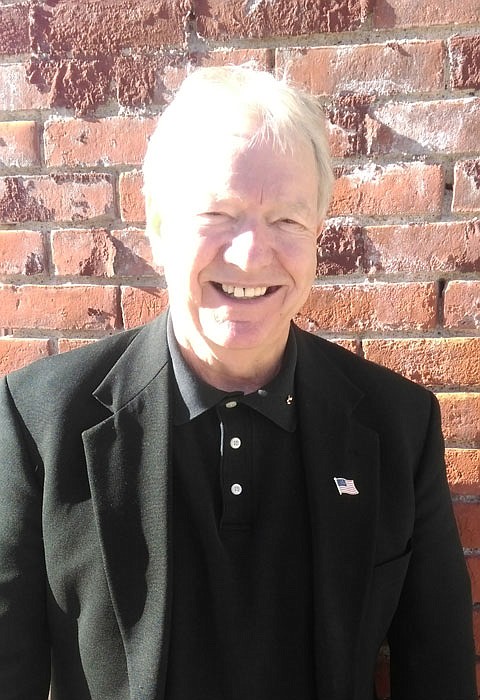Characterized by a sharp wit and boisterous demeanor, Jefferson City veteran Roy Viessman enjoys recounting the many experiences woven into his personality. But the true foundation of his life's journey, he affirms, began with his service in the armed forces - a specific point that helped him develop the perseverance that would carry him into adulthood.
Raised in Osage County, Viessman finished his junior year at Fatima High School in Westphalia in 1961, at which time he chose to forego completing his education in order to fulfill his dream to join the U.S. Navy.
"I was sworn in the day I turned 17 years old - Aug. 16, 1961," the veteran recalled. "My parents weren't too happy that I left school early to do so, but they went ahead and signed for me because it was something I had wanted to do since I was a kid."
The young man was soon on his way to the naval training station in San Diego for several weeks of basic training, followed by his assignment to a naval assault division comprised of the Landing Craft Utility (LCU) - a type of boat used to transport troops and equipment during amphibious landings.
"Essentially our job was to hook up with the Marine Corps and transport them from ship to shore," Viessman explained. "The boat was about 135 feet long and carried around 12 sailors. We all lived on board the ship."
Following his assignment to the LCU, Viessman was sent to Signalman School to learn various forms of visual communications consisting of semaphore (communication by flag) and flashing lights. Additionally, he and several of his fellow sailors attended Marine Corps infantry training at Camp Pendleton, Calif., "in case they were stranded on shore with the Marines during a mission," he said.
"We spent some time training along the West Coast before going overseas," Viessman said. "During the time I was in the Navy, I participated in three overseas tours, dropping off Marines in locations throughout the Western Pacific in places such as Okinawa, Midway, Guam, Japan and many places in between."
The veteran humbly described his service in the early 1960s: "I don't remember ever dropping off the Marines on a hostile beach or ever being in harm's way, but I do remember hitting a couple of hostile bars," he chuckled.
When his intial four-year commitment was completed in August 1965, Viessman made the decision to leave the Navy. He remained in the San Diego area to work construction during the day and attended the Bob Wade School of Radio in the evenings, clinging to the aspiration of some day becoming a disc jockey.
"After several months of school, I finally graduated and did some local radio work nothing of any consequence, though," he said. "I then heard the San Diego Police Department was hiring; I was able to get on with them in the summer of 1967 and spent the next seven years working there."
In 1974, he concluded it was time to return to Missouri. The veteran relocated to Jefferson City and was soon hired as a trackman with the Missouri Pacific Railroad (later becoming Union Pacific), eventually working his way up to locomotive engineer. But in the mid-1980s, while "running around with a Marine Corps recruiter," he decided he had let an opportunity pass him by many years earlier.
"I had always felt as though I had missed out on something because I always enjoyed working with the Marines back when I was in the Navy," Viessman said. "This friend of mine thought he could get me in the Marines but since I was in my early 40s, nothing seemed to work even though I tried for over a year."
Eventually, the aspiring Marine met a Navy chief on recruiting duty who said he could enlist him into the Navy and assign him as a corpsman attached to the 4th Marine Division, which had a reserve detachment located in St. Louis.
"I ended up taking several written tests and was finally offered a two-year committment," Viessman said. "I was 44 years old and took a leave of absence from the railroad. I began taking on-the-job training at Fort Leonard Wood, thinking they would soon send me to Corpsman School."
As the veteran recalled, 18 months into his new assignment, the promise of placing him with the Marine Corps would not materialize when he was informed he would be reassigned to a Navy Reserve unit in St. Joseph.
"I told them that if I can't stay with the (Marine) Corps, then I'm done; I had already done the Navy thing back in the 1960s."
Viessman returned to his job with the railroad from which he retired in 2002. Throughout the years, he has remained active in his community and served four terms on the Jefferson City Council.
In a discussion of recent political events, Viessman maintained that although the United States has undergone many significant changes in recent decades, one constant has been his love and devotion to his country - a reality that has been cemented by his time spent in uniform.
"There have been times it has been hard to love our country, I admit, but this country his worth loving," he stressed. "My time in the service has been a good platform and provided me the stability to show me how to be a good citizen of the United States, while also teaching me the value and costs of our freedom."
He added, "Sometimes there are those who fail to realize how much something is truly worth until they have to pay for it." Pausing, he concluded, "And that reminds me of an epitaph on the grave of a World War II soldier who lost his life in battle, that read, 'Tell them of us and say, for your tomorrow, we gave our today.'"
Jeremy P. Amick writes on behalf of the Silver Star Families of America.

